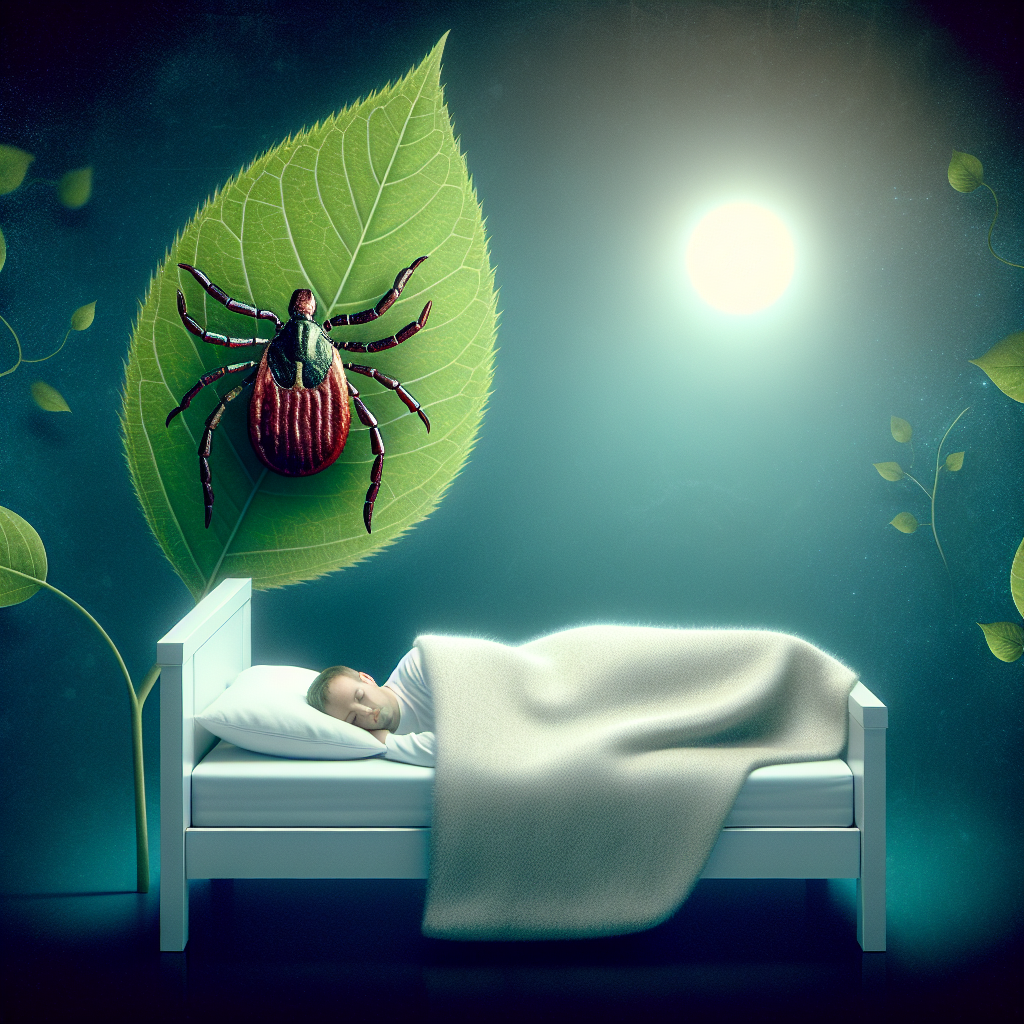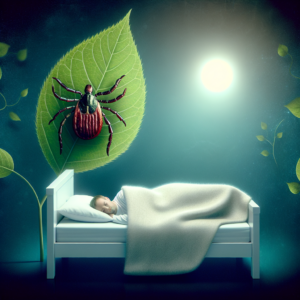
Discovering the Connection: Sleep’s Role in Lyme Disease
Sleep is the unsung hero of our health, often taken for granted until it’s elusive. For those battling Lyme disease, the quality and quantity of sleep can significantly affect the course of the illness. Let’s explore the critical connection between restful slumber and managing Lyme disease.
Key Takeaways
-
Sleep disruption can exacerbate Lyme disease symptoms.
-
Adequate rest supports the immune system’s fight against infection.
-
Chronic Lyme disease sufferers often experience sleep disorders.
-
Improving sleep quality can aid in the management of Lyme disease.
-
Strategies exist to enhance sleep for those with Lyme disease.
Understanding Lyme Disease
Defining Lyme Disease and Its Symptoms
Lyme disease is an infection caused by the bacterium Borrelia burgdorferi, transmitted to humans through the bite of infected black-legged ticks. Recognizing the symptoms early is crucial for effective treatment.
-
A telltale bull’s-eye rash around the bite site.
-
Fever, chills, and body aches, akin to flu symptoms.
-
Fatigue that doesn’t seem to lift with rest.
-
Joint pain that can be severe and migrate from one joint to another.
-
Neurological problems, such as Bell’s palsy or meningitis.
Remember, not everyone with Lyme disease gets the rash, so it’s important to consider these other symptoms, especially after a tick bite or spending time in tick-prone areas.
The Stages and Long-Term Effects of Lyme
Lyme disease progresses in stages, starting with the early localized stage, which includes the rash and flu-like symptoms. If untreated, it can spread to the joints, heart, and nervous system. Chronic Lyme disease, or Post-Treatment Lyme Disease Syndrome (PTLDS), can persist for months or even years, leading to a diminished quality of life.
Those with chronic Lyme may face:
-
Persistent joint and muscle pain.
-
Cognitive difficulties, often referred to as “brain fog”.
-
Continual fatigue, which rest doesn’t seem to alleviate.
-
Emotional changes, including depression and anxiety.
It’s a tough journey, but understanding the disease is the first step toward taking control of your health.
The Science Behind Sleep
Why is sleep so important? It’s the time when our bodies repair and rejuvenate. During sleep, the immune system releases cytokines, proteins that are crucial for fighting off infections and inflammation.
Think of sleep as the night shift for your body’s maintenance crew. It’s when repairs are done, and the immune system is bolstered to stand guard against invaders like Borrelia burgdorferi.
But it’s not just about the quantity of sleep; the quality matters too. Deep sleep stages are when the most potent immune responses occur. Disruptions in sleep can lead to a less effective immune response, making it harder for your body to fight Lyme disease.
So, getting a good night’s sleep isn’t just about feeling rested. It’s about giving your body the best chance to combat the challenges Lyme disease brings.
Why Your Body Needs Sleep
Imagine your body as a bustling city. Just like a city needs downtime for maintenance and cleaning, your body needs sleep to repair tissues, synthesize hormones, and consolidate memories. This nightly reset helps regulate mood, appetite, and cognitive function. It’s a fundamental pillar of health, as critical as eating or breathing.
-
Cell regeneration and repair occur during sleep.
-
Hormones that regulate growth and appetite are released.
-
Memory consolidation happens, helping us learn and retain information.
-
Detoxification processes in the brain clear out daily metabolic waste.
-
Emotional processing and stress regulation are facilitated.
Without enough sleep, all these essential functions are compromised, which can lead to a weakened immune response and a host of other health issues.
Understanding Sleep Cycles and Their Importance
Our sleep is divided into cycles, each lasting about 90 minutes. These cycles alternate between Rapid Eye Movement (REM) and Non-REM stages. Non-REM sleep has three phases, each deeper than the last, and it’s during these stages that the body repairs itself. REM sleep, on the other hand, is when we dream and process emotions.
-
Non-REM sleep is crucial for physical restoration.
-
REM sleep supports learning, memory, and emotional health.
-
A full sleep cycle helps maintain the balance between body and mind.
A disrupted sleep cycle can prevent you from reaching the deeper, restorative stages of sleep, leaving you feeling unrefreshed and mentally foggy the next day.
When Lyme Meets Sleep: The Complex Relationship
The interplay between Lyme disease and sleep is a tangled web. The infection itself, along with the stress and discomfort it brings, can be a significant barrier to restful sleep. Yet, good sleep is precisely what the body needs to fight the infection effectively. It’s a catch-22 situation that can be frustrating and debilitating for those affected.
How Infection Can Disrupt Rest
Lyme disease can disrupt sleep in several ways. The pain and discomfort from swollen joints can make it hard to find a comfortable sleeping position. Night sweats and fever can wake you frequently. Moreover, the neurological impact of Lyme can lead to sleep disorders like insomnia or sleep apnea.
-
Joint pain can cause frequent awakenings or difficulty falling asleep.
-
Night sweats and fever disrupt the sleep cycle, leading to fragmented sleep.
-
Neurological symptoms can directly impact sleep quality and duration.
Addressing these disruptions is a critical component of Lyme disease management.
The Vicious Cycle: Poor Sleep and Lyme Disease Progression
Poor sleep can exacerbate the symptoms of Lyme disease, creating a vicious cycle. Lack of sleep weakens the immune system, making it less effective at fighting the infection, which in turn can lead to increased symptom severity and further sleep disruption. Breaking this cycle is a key goal in the treatment of Lyme disease.
-
Insufficient sleep weakens the immune response.
-
A weakened immune system may increase the severity of Lyme symptoms.
-
Worsening symptoms can lead to further sleep disturbances.
Recognizing this cycle is the first step towards interrupting it and improving both sleep and disease outcomes.
Common Sleep Challenges for Lyme Patients
Those with Lyme disease often face a range of sleep challenges that go beyond the typical insomnia many people experience. These can include sleep-disordered breathing, restless legs syndrome, and periodic limb movement disorder, all of which can severely disrupt the sleep cycle and prevent the deep, restorative sleep needed for healing.
-
Insomnia: Difficulty falling asleep or staying asleep throughout the night.
-
Sleep-disordered breathing: Conditions like sleep apnea that interrupt breathing during sleep.
-
Restless legs syndrome: An irresistible urge to move the legs, often accompanied by uncomfortable sensations.
-
Periodic limb movement disorder: Involuntary movements that can wake you from sleep.
-
Narcolepsy: Extreme daytime drowsiness and sudden bouts of sleep.
Understanding and addressing these specific sleep challenges is crucial for Lyme disease patients seeking to improve their overall health and wellbeing.
Identifying Specific Sleep Disorders Linked to Lyme
When it comes to Lyme disease, the sleep disorders patients experience aren’t just your garden-variety insomnia. There are specific conditions that are frequently observed in those suffering from Lyme. These include sleep apnea, where breathing stops and starts throughout the night; restless legs syndrome, which causes an uncontrollable urge to move the legs; and narcolepsy, which can lead to sudden episodes of sleep during the day. Recognizing these disorders is the first step to tackling them head-on.
-
Sleep Apnea: Interrupted breathing that reduces sleep quality.
-
Restless Legs Syndrome: Discomfort and leg movements that disturb sleep.
-
Narcolepsy: Uncontrollable daytime sleepiness and sudden sleep attacks.
-
Chronic Insomnia: Persistent trouble falling or staying asleep.
-
Neuropathy: Nerve pain that can interrupt a good night’s rest.
Identifying these conditions often requires a professional evaluation, including sleep studies that monitor breathing, muscle activity, and brain waves.
Strategies to Address Lyme-Related Insomnia
Insomnia can be a stubborn opponent, especially when paired with Lyme disease. But there are strategies that can help you reclaim the restorative sleep you need. Start with a consistent sleep schedule, going to bed and waking up at the same time every day. Limit exposure to screens before bedtime, as the blue light can hinder melatonin production. And consider relaxation techniques such as deep breathing or progressive muscle relaxation to ease into sleep.
-
Establish a regular sleep schedule to regulate your body’s clock.
-
Reduce blue light exposure in the evening to promote melatonin production.
-
Use relaxation techniques to calm the mind and prepare for sleep.
-
Keep the bedroom cool, dark, and quiet to create an ideal sleeping environment.
-
Limit caffeine and heavy meals before bedtime to avoid disruptions to sleep.
By adopting these habits, you can set the stage for a better night’s sleep, which is a powerful ally in the fight against Lyme disease.
Improving Sleep Quality for Lyme Disease Sufferers
Creating a Sleep-Inducing Environment
Your bedroom should be a sanctuary that signals to your body it’s time to wind down. Ensure your mattress and pillows provide the right support and comfort. Use blackout curtains to keep it dark, and consider white noise machines to drown out disruptive sounds. The temperature should be slightly cool, as it helps to signal your body that it’s time to sleep. These small changes can make a big difference in the quality of your sleep.
-
Invest in a comfortable mattress and pillows that support your body.
-
Use blackout curtains to maintain darkness throughout the night.
-
Consider a white noise machine to mask disruptive sounds.
-
Keep the room at a cool temperature to facilitate sleep onset.
By transforming your bedroom into a sleep haven, you’ll be better equipped to get the rest you need to manage Lyme disease.
Natural Sleep Aids and Mind-Body Techniques
Natural sleep aids like melatonin supplements can help regulate your sleep cycle, especially when traveling or adjusting to a new schedule. Herbs such as valerian root and chamomile are also popular for their calming effects. Beyond supplements, mind-body techniques like meditation, yoga, and tai chi can reduce stress and improve sleep. These practices encourage mindfulness and relaxation, which can ease the transition into sleep.
-
Melatonin supplements can help reset your sleep cycle.
-
Valerian root and chamomile can be used for their sedative properties.
-
Meditation and mindfulness can calm an overactive mind.
-
Yoga and tai chi combine physical movement with mental focus to promote relaxation.
Incorporating these natural remedies and practices into your routine can enhance your sleep quality, providing a solid foundation for your body to combat Lyme disease.
Medical Interventions and Lyme Disease
While natural remedies and lifestyle changes are beneficial, sometimes medical interventions are necessary to manage Lyme disease and its impact on sleep. Antibiotics are the first line of defense against the infection. In some cases, medications to manage symptoms like pain and sleep disturbances may also be prescribed. It’s essential to work closely with your healthcare provider to determine the best course of treatment for your specific situation.
-
Antibiotics to address the underlying Lyme infection.
-
Pain relievers to manage joint and muscle pain that can disrupt sleep.
-
Sleep medications, if necessary, to help establish a regular sleep pattern.
-
Antidepressants or anti-anxiety medications to address mood disorders that can affect sleep.
Medical treatments should always be tailored to the individual, taking into account the severity of symptoms and any other underlying health conditions.
Remember, the goal is to support your body’s natural ability to heal and fight the infection, and quality sleep is a critical component of that process. By addressing Lyme disease comprehensively, including its impact on sleep, you can improve your overall health and well-being.
Potential Treatments and Their Impact on Sleep
When battling Lyme disease, the right treatment can make all the difference, not just for the disease itself but for sleep quality too. Antibiotics are the frontline warriors against Lyme, but they can sometimes cause side effects that affect sleep, such as gastrointestinal discomfort or increased anxiety. Other treatments, like pain management and sleep aids, can help ease discomfort and promote better sleep but should be used judiciously as they can become less effective over time.
-
Antibiotics may disrupt the gut microbiome, leading to discomfort that can affect sleep.
-
Pain medications can provide relief, allowing for more restful sleep.
-
Sleep aids should be used sparingly to avoid dependence and tolerance.
-
Certain herbal supplements may support sleep without the harsh side effects of prescription drugs.
It’s important to have an open dialogue with your healthcare provider about how treatments may impact your sleep and to find a balance that supports both your recovery from Lyme disease and your sleep health.
When to Consult a Specialist about Sleep and Lyme Disease
If you’re struggling with sleep despite trying various strategies and lifestyle changes, it might be time to consult a specialist. This is particularly true if you’re experiencing persistent insomnia, sleep apnea symptoms, or other sleep disorders that don’t improve with standard interventions. A sleep specialist can conduct a thorough evaluation, often including a sleep study, to pinpoint the exact nature of your sleep issues and provide targeted treatment options.
-
Consult a specialist if sleep issues persist despite home remedies and lifestyle changes.
-
Signs of sleep apnea, such as snoring and daytime fatigue, warrant professional evaluation.
-
A sleep study can provide insights into sleep patterns and disorders.
Getting professional help can be a game-changer in managing sleep issues associated with Lyme disease.
Lifestyle Adjustments to Support Better Sleep
Diet and Exercise: Their Role in Sleep Health
What you eat and how you move can have a profound impact on your sleep. A balanced diet rich in fruits, vegetables, lean proteins, and whole grains can promote better sleep by regulating blood sugar levels and supporting overall health. Exercise, particularly aerobic activities, can help tire the body naturally, leading to more restful sleep. However, timing is key; avoid vigorous exercise close to bedtime as it can be too stimulating.
-
Eat a balanced diet to maintain steady energy levels throughout the day.
-
Include foods rich in magnesium and potassium, like bananas and spinach, to support muscle relaxation and sleep.
-
Regular aerobic exercise can improve sleep quality but should be done earlier in the day.
-
Avoid heavy meals, caffeine, and alcohol close to bedtime.
By paying attention to diet and exercise, you can naturally enhance your sleep quality, helping your body to fight Lyme disease more effectively.
Mindfulness and Stress Reduction Techniques
Stress and anxiety are common companions of chronic illness, and they can wreak havoc on sleep. Mindfulness and stress reduction techniques can be powerful tools in calming the mind and preparing the body for sleep. Practices like guided imagery, deep breathing exercises, and progressive muscle relaxation can help ease the tension of the day and transition into a more peaceful state conducive to sleep.
-
Guided imagery can transport your mind to a calm, serene place, easing anxiety and promoting relaxation.
-
Deep breathing exercises help slow the heart rate and calm the nervous system.
-
Progressive muscle relaxation involves tensing and relaxing muscles systematically to release physical tension.
Incorporating these techniques into your evening routine can help you manage stress and encourage better sleep, aiding in your recovery from Lyme disease.
Navigating the Next Steps: A Path Toward Restorative Rest
The journey toward restorative rest can be challenging, especially when dealing with Lyme disease. But with the right approach, it’s possible to improve your sleep and, in turn, your overall health. Start by evaluating your sleep habits and environment, then consider natural sleep aids and lifestyle changes. If these steps aren’t enough, don’t hesitate to seek professional help. Remember, sleep is a critical component of your body’s healing process, and prioritizing it is not just a matter of comfort, but a key part of your treatment strategy.
As you navigate the path toward better sleep, keep track of what works for you and what doesn’t. Your journey is personal, and what helps one person may not help another. Stay patient and persistent, and know that each step you take is a step toward a healthier, more vibrant you.
Frequently Asked Questions (FAQ)
Can Lyme disease cause permanent sleep disturbances?
While Lyme disease can lead to significant sleep disruptions, these are usually not permanent. With proper treatment and management of the disease, many patients see an improvement in their sleep quality. However, it’s essential to address sleep issues actively as part of the overall treatment plan for Lyme disease to prevent long-term problems.
Is it normal to experience vivid dreams with Lyme disease?
Yes, it’s not uncommon for individuals with Lyme disease to report vivid dreams or nightmares. This can be due to a combination of factors, including fever, medications, and the stress associated with chronic illness. If vivid dreams are affecting your sleep quality, relaxation techniques before bed may help.
How long does it take to improve sleep after starting Lyme disease treatment?
The time it takes to see improvement in sleep after starting treatment for Lyme disease can vary widely. Some patients may notice changes within a few weeks, while others may take longer. It’s important to give your body time to respond to treatment and to continue practicing good sleep hygiene.
Are there specific types of mattresses or pillows that can help with Lyme-related sleep issues?
While there’s no one-size-fits-all solution, many Lyme patients find that mattresses and pillows offering proper support can alleviate discomfort, especially if joint pain is a symptom. Look for products that can be adjusted for firmness or that are designed to reduce pressure points. Memory foam or latex mattresses and ergonomic pillows are often recommended.
Can sleep medication hinder Lyme disease recovery?
Sleep medications can provide short-term relief but are not typically a long-term solution. They can sometimes mask underlying issues that need to be addressed. It’s crucial to use them under the guidance of a healthcare provider and to pair them with lifestyle changes that promote natural sleep.

